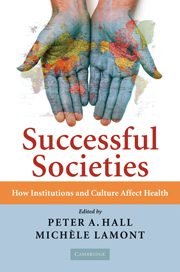Book contents
- Frontmatter
- Contents
- Contributors
- Preface
- Introduction
- 1 Population Health and the Dynamics of Collective Development
- 2 Social Interactions in Human Development: Pathways to Health and Capabilities
- 3 Health, Social Relations, and Public Policy
- 4 Population Health and Development: An Institutional-Cultural Approach to Capability Expansion
- 5 Responding to AIDS in Sub-Saharan Africa: Culture, Institutions, and Health
- 6 Responses to Racism, Health, and Social Inclusion as a Dimension of Successful Societies
- 7 Collective Imaginaries and Population Health: How Health Data Can Highlight Cultural History
- 8 Making Sense of Contagion: Citizenship Regimes and Public Health in Victorian England
- 9 The Multicultural Welfare State?
- 10 From State-Centrism to Neoliberalism: Macro-Historical Contexts of Population Health since World War II
- Bibliography
- Index
Preface
Published online by Cambridge University Press: 05 June 2012
- Frontmatter
- Contents
- Contributors
- Preface
- Introduction
- 1 Population Health and the Dynamics of Collective Development
- 2 Social Interactions in Human Development: Pathways to Health and Capabilities
- 3 Health, Social Relations, and Public Policy
- 4 Population Health and Development: An Institutional-Cultural Approach to Capability Expansion
- 5 Responding to AIDS in Sub-Saharan Africa: Culture, Institutions, and Health
- 6 Responses to Racism, Health, and Social Inclusion as a Dimension of Successful Societies
- 7 Collective Imaginaries and Population Health: How Health Data Can Highlight Cultural History
- 8 Making Sense of Contagion: Citizenship Regimes and Public Health in Victorian England
- 9 The Multicultural Welfare State?
- 10 From State-Centrism to Neoliberalism: Macro-Historical Contexts of Population Health since World War II
- Bibliography
- Index
Summary
This book is the result of an encounter between a heterogeneous group of social scientists and the Canadian Institute for Advanced Research (CIFAR). This innovative research organization has a well-established practice of supporting the work of researchers over several years so that they can engage in interdisciplinary exploration of new and important topics. Unlike other funding organizations, CIFAR gives its researchers carte blanche. It does not require a predefined plan with clear deliverables. It recognizes the open-ended nature of the research process and aims to facilitate and empower it. This highly original approach often leads to unexpected results.
In 2002, some of us were contacted by CIFAR and asked to come together to think about what defines successful societies and the social conditions that sustain them. After supporting research teams in the fields of population health and human development for a decade, CIFAR was turning its efforts in a new direction to consider a wider range of social factors affecting population health. It called upon us to bring to the table the analytical tools we had deployed in our respective research on a range of topics, including the impact of institutions and cultural frameworks on social relations. Thus an interdisciplinary team that included sociologists, political scientists, a historian, an epidemiologist, and a psychologist came together. We met several times a year in various locations to exchange papers, to learn from each others' work, and to interact with other scholars.
- Type
- Chapter
- Information
- Successful SocietiesHow Institutions and Culture Affect Health, pp. xi - xiiPublisher: Cambridge University PressPrint publication year: 2009

